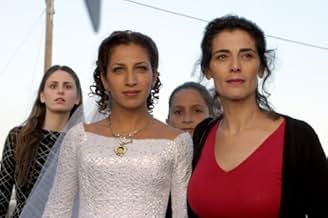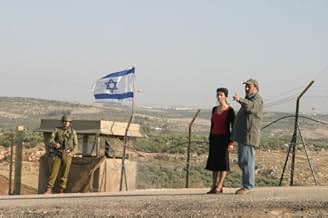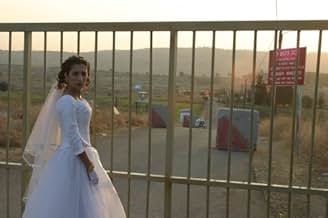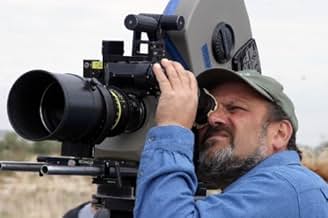NOTE IMDb
7,4/10
3,5 k
MA NOTE
Mona doit se rendre en Syrie pour finaliser les détails du mariage arrangé entre elle et son cousin, une star de la télé. Mona sait qu'une fois là-bas, elle ne pourra plus jamais revoir sa f... Tout lireMona doit se rendre en Syrie pour finaliser les détails du mariage arrangé entre elle et son cousin, une star de la télé. Mona sait qu'une fois là-bas, elle ne pourra plus jamais revoir sa famille sur le plateau du Golan.Mona doit se rendre en Syrie pour finaliser les détails du mariage arrangé entre elle et son cousin, une star de la télé. Mona sait qu'une fois là-bas, elle ne pourra plus jamais revoir sa famille sur le plateau du Golan.
- Réalisation
- Scénario
- Casting principal
- Récompenses
- 8 victoires et 15 nominations au total
Hiam Abbass
- Amal
- (as Hiyam Abbass)
Makram Khoury
- Hammed
- (as Makram J. Khoury)
Ashraf Barhom
- Marwan
- (as Ashraf Barhoum)
Evelyn Kaplun
- Evelyna
- (as Evelyne Kaplun)
Adnan Tarabshi
- Amin
- (as Adnan Trabshi)
Marlene Bajali
- The Mother
- (as Marlene Bajjali)
Uri Gavriel
- Simon
- (as Uri Gabriel)
Robert Henig
- Joseph
- (as Robert Hoenig)
Avis à la une
In Majdal Shams, the largest Druze village in Golan Heights on the Israeli-Syrian border, the Druze bride Mona (Clara Khoury) is engaged to get married with Tallel (Dirar Suleiman), a television comedian that works in the Revolution Studios in Damascus, Syria. They have never met each other because of the occupation of the area by Israel since 1967; when Mona moves to Syria, she will lose her undefined nationality and will never be allowed to return home. Mona's father Hammed (Makram J. Khoury) is a political activist pro-Syria that is on probation by the Israeli government. His older son Hatten (Eyad Sheety) married a Russian woman eight years ago and was banished from Majdal Shams by the religious leaders and his father. His brother Marwan (Ashraf Barhoum) is a wolf trader that lives in Italy. His sister Amal (Hiyan Abbass) has two teenager daughters and has the intention to join the university, but her marriage with Amin (Adnan Trabshi) is in crisis. When the family gathers for Mona's wedding, an insane bureaucracy jeopardizes the ceremony.
"The Syrian Bride" is an impressive movie, especially considering the nationality of the Israeli director Eran Riklis. I had no idea that in the twenty-first century could exist a place where people has "undefined nationality". The metaphoric situation of the Druze people, represented by the bride and her family, trapped in the non-sense bureaucracy, lack of interest from the governments in resolving the problem and having to face arrogant heartless authorities represented by the despicable chief of the Israeli police is amazing. The acting is top-notch, the plot is original and unique and I really loved this great movie. My vote is eight.
Title (Brazil): "A Noiva Síria" ("The Syrian Bride")
"The Syrian Bride" is an impressive movie, especially considering the nationality of the Israeli director Eran Riklis. I had no idea that in the twenty-first century could exist a place where people has "undefined nationality". The metaphoric situation of the Druze people, represented by the bride and her family, trapped in the non-sense bureaucracy, lack of interest from the governments in resolving the problem and having to face arrogant heartless authorities represented by the despicable chief of the Israeli police is amazing. The acting is top-notch, the plot is original and unique and I really loved this great movie. My vote is eight.
Title (Brazil): "A Noiva Síria" ("The Syrian Bride")
I saw this one today and it completely blew me away. It's one of many truly wonderful Israeli films that were made this year. The main story is very moving and easily connected to, and the secondary plot lines are great as well. Details that are featured in the film are very accurate, for the most part, as are the situations and the characters. Viewers can easily relate to the desperate attempts to cut through the red tape, and to the bride's feelings of hopelessness and fear. Notice that the bride speaks fairly little, and yet her vacant, hardly-ever-smiling face is expressive enough. The movie simply draws you in, because of its authenticity.
The acting is superb, especially that of Markam Khoury as the father of the bride, Hiyam Abbas as the independent older sister and, of course, Klara Khoury as the Syrian Bride herself. The movie is quadrolingual, and sorta has Hebrew take a back seat. It's mostly in Arabic, and also has some English, Russian and a few words of French. Most viewers will probably be doing quite a lot of reading (subtitles) in this movie, but it's worth it.
The year of 2004 was an amazingly productive one for Israeli cinema, and The Syrian Bride is no exception. You do not want to miss this one.
The acting is superb, especially that of Markam Khoury as the father of the bride, Hiyam Abbas as the independent older sister and, of course, Klara Khoury as the Syrian Bride herself. The movie is quadrolingual, and sorta has Hebrew take a back seat. It's mostly in Arabic, and also has some English, Russian and a few words of French. Most viewers will probably be doing quite a lot of reading (subtitles) in this movie, but it's worth it.
The year of 2004 was an amazingly productive one for Israeli cinema, and The Syrian Bride is no exception. You do not want to miss this one.
The story line touches many open sores afflicting the Israeli society, prejudice towards ethnic minorities, unwillingness of factions in that society to try and understand and accept one another, police bigotry and sheer racism. As an Israeli living abroad I could relate to all of the above. However, you don't have to be from that region to appreciate this moving and powerful Drama. The film basically deals with the horrific struggle of a family, from a marginalised sector of Israeli society, to get their daughter married to a man over the Syrian boarder however, by doing that they will never be able to see her again. A very very emotional and humane film.
This deceptively modest 2004 film lingers in the memory because of the bigger sociopolitical context that Israeli director Eran Riklis provides in setting his story in the Golan Heights, an area occupied by Israel since the Six-Day War in 1967. Over the course of one day, the story revolves around an extended Druze family in the northern village of Majdal Shams where they are preparing for the wedding of youngest daughter Mona. The catch is that she has never met the groom, a distant relative who happens to be a big Syrian TV personality in Damascus. It sounds like the source of comedy hijinks, but there is a sad undertone because once married, Mona officially becomes Syrian and cannot return home to her family.
The intended couple, however, is not the focus as much as the family dynamics that become ignited by the wedding. The patriarch is Hammed, a political activist on probation, and he has two sons - Hattem, who has been cast out by the conservative religious cabal for leaving the country and marrying a Russian woman, and Marwan, who provides the comedy relief as a womanizing salesman. The glue of the family, however, is provided by eldest sister Amal, who defiantly stands up to the men in her family and wants to get her bachelor's degree in Haifa. The first hour deals mainly with the standard pre-wedding confusion, though it happens to take place on the same day that Syrian President Bashar al-Assad succeeded his father, but the last half-hour takes place entirely at the Israel-Syria border crossing where the officials from both countries refuse to cooperate with a negotiating Red Cross worker in allowing Mona to enter Syria.
With its primarily somber tone, this is no Middle Eastern derivative of "My Big, Fat Greek Wedding", but Riklis and co-screenwriter Suha Arraf supply genuine warmth toward the characters and bring immediacy and credibility to the personal situation at hand. The acting is solid with Hiam Abbass the standout as Amal. There are nice turns by Makram Khoury as Hammed, his real-life daughter Clara as Mona, Eyad Sheety as Hattem and Ashraf Barhom who steals scenes as the gap-toothed Marwan. Special mention should be made for Michael Wiesweg's expert cinematography which perfectly captures the mostly sun-baked terrain. This is a case where the 2006 DVD package from Koch Lorber is invaluable for the context it provides to the movie's story. The making-of featurette, an extensive interview with Riklis and his accompanying commentary all help considerably in understanding the political situation that both drives and reflects the wedding preparation complications. Also included is the original trailer as well as the U.S. version.
The intended couple, however, is not the focus as much as the family dynamics that become ignited by the wedding. The patriarch is Hammed, a political activist on probation, and he has two sons - Hattem, who has been cast out by the conservative religious cabal for leaving the country and marrying a Russian woman, and Marwan, who provides the comedy relief as a womanizing salesman. The glue of the family, however, is provided by eldest sister Amal, who defiantly stands up to the men in her family and wants to get her bachelor's degree in Haifa. The first hour deals mainly with the standard pre-wedding confusion, though it happens to take place on the same day that Syrian President Bashar al-Assad succeeded his father, but the last half-hour takes place entirely at the Israel-Syria border crossing where the officials from both countries refuse to cooperate with a negotiating Red Cross worker in allowing Mona to enter Syria.
With its primarily somber tone, this is no Middle Eastern derivative of "My Big, Fat Greek Wedding", but Riklis and co-screenwriter Suha Arraf supply genuine warmth toward the characters and bring immediacy and credibility to the personal situation at hand. The acting is solid with Hiam Abbass the standout as Amal. There are nice turns by Makram Khoury as Hammed, his real-life daughter Clara as Mona, Eyad Sheety as Hattem and Ashraf Barhom who steals scenes as the gap-toothed Marwan. Special mention should be made for Michael Wiesweg's expert cinematography which perfectly captures the mostly sun-baked terrain. This is a case where the 2006 DVD package from Koch Lorber is invaluable for the context it provides to the movie's story. The making-of featurette, an extensive interview with Riklis and his accompanying commentary all help considerably in understanding the political situation that both drives and reflects the wedding preparation complications. Also included is the original trailer as well as the U.S. version.
"The Syrian Bride" uses the familiar comic genre of the colliding tensions in an extended family wedding to humanistically illuminate Middle East political, gender, generational, religious, modernization and economic tensions coming down to human relationships vs. bureaucracies.
Co-writers Suha Arraf (a Palestinian journalist) and Israeli director Eran Riklis pile almost too much on to this one Druze (Israeli Arab) family living in the occupied Golan Heights in order to make the personal political. The tensions, poignancy and symbolism of a wedding are heightened because when this bride leaves her home for her arranged marriage with a Syrian celebrity, she will not be able to return home.
Every complicated character has a complicated background, whether theirs or their parents' politics or their religiosity or their dress or their educational or romantic aspirations-- and is in a complicated relation to every other character and the authorities.
In addition to the return of prodigal sons from overseas, the larger community intrudes on the intra-family tensions, from robed tribal elders and the police who each bring warnings of proper behavior to a comical videographer. My dependency on English subtitles lessened some of the impact of hearing characters switch from Arabic to Hebrew to French to Russian to English to communicate, as part of the interactions are based on who can understand different languages and who can't. This complex in-gathering all symbolically happens the same day as a demonstration in support of the change over of power in Syria from the father the dictator to the son, while a flat tire leads to a crucial delay. The ubiquitous television, and government attention, however, is focused on the West Bank, making this border a forgotten zone as well as a no (wo)man's land.
What makes it all hang together amidst this human comedy is the central focus from the start to the finish on the almost silent bride, dressed in Western white, and her more verbal older sister, rebelliously in slacks, and both played by powerful actresses. Each has made choices in the past they regret and each chooses their future now, despite the efforts of all their male relatives, let alone global politics, to thwart them and make them helpless.
Even with the heavy-handed baggage of all the "Crash"-like coincidences, the film beautifully makes the point that politics isn't just ideology but affects how people get on with the basics of their lives.
Co-writers Suha Arraf (a Palestinian journalist) and Israeli director Eran Riklis pile almost too much on to this one Druze (Israeli Arab) family living in the occupied Golan Heights in order to make the personal political. The tensions, poignancy and symbolism of a wedding are heightened because when this bride leaves her home for her arranged marriage with a Syrian celebrity, she will not be able to return home.
Every complicated character has a complicated background, whether theirs or their parents' politics or their religiosity or their dress or their educational or romantic aspirations-- and is in a complicated relation to every other character and the authorities.
In addition to the return of prodigal sons from overseas, the larger community intrudes on the intra-family tensions, from robed tribal elders and the police who each bring warnings of proper behavior to a comical videographer. My dependency on English subtitles lessened some of the impact of hearing characters switch from Arabic to Hebrew to French to Russian to English to communicate, as part of the interactions are based on who can understand different languages and who can't. This complex in-gathering all symbolically happens the same day as a demonstration in support of the change over of power in Syria from the father the dictator to the son, while a flat tire leads to a crucial delay. The ubiquitous television, and government attention, however, is focused on the West Bank, making this border a forgotten zone as well as a no (wo)man's land.
What makes it all hang together amidst this human comedy is the central focus from the start to the finish on the almost silent bride, dressed in Western white, and her more verbal older sister, rebelliously in slacks, and both played by powerful actresses. Each has made choices in the past they regret and each chooses their future now, despite the efforts of all their male relatives, let alone global politics, to thwart them and make them helpless.
Even with the heavy-handed baggage of all the "Crash"-like coincidences, the film beautifully makes the point that politics isn't just ideology but affects how people get on with the basics of their lives.
Le saviez-vous
- AnecdotesMakram Khoury and Clara Khoury are father and daughter in the film as well as in real life.
- GaffesMona's father says he has raised her for 25 years. However, she states her birth date as November 30th 1976 and the movie is set on July 17th 2000. That would make her only 23 years old.
- ConnexionsFeatured in The Making of The Syrian Bride (2005)
- Bandes originalesBride Theme
Music Composed & Conducted by Cyril Morin
Performed by Bulgarian Symphony Orchestra-Sif 309
Meilleurs choix
Connectez-vous pour évaluer et suivre la liste de favoris afin de recevoir des recommandations personnalisées
- How long is Syrian Bride?Alimenté par Alexa
Détails
Box-office
- Montant brut aux États-Unis et au Canada
- 380 505 $US
- Week-end de sortie aux États-Unis et au Canada
- 7 235 $US
- 20 nov. 2005
- Montant brut mondial
- 1 522 967 $US
- Durée
- 1h 37min(97 min)
- Couleur
- Mixage
- Rapport de forme
- 2.35 : 1
Contribuer à cette page
Suggérer une modification ou ajouter du contenu manquant
































